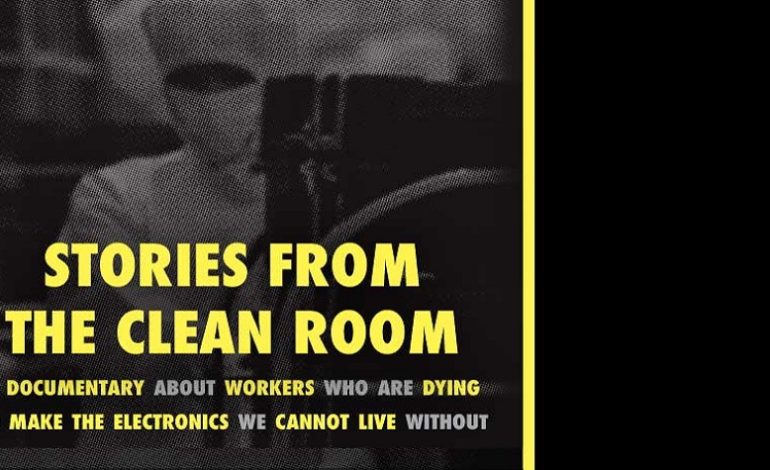Korean Documentary Exposes Dirty Truths about Electronics Industry

When Hwang Sang-Gi lost his 22-year-old daughter, Hwang Yumi, to leukemia, he realized that she had been ill since she started working for electronics giant Samsung. He also later learned that many other young women in the production line had also died from the same disease.
Sang-Gi’s story was one of the 23 harrowing stories told in the documentary Stories from the Clean Room, which exposes the dirty truths coming from the clean room of electronics factory. Clean room is the part of a factory where workers work with dangerous and toxic chemicals to produce LCD screens and chips. The film shows how big and well-known companies often put their workers’ lives and well-being in danger in producing electronic products, a condition largely unknown by consumers who purchase TVs, computers, and mobile phones.
Produced by South Korea’s non-profit organization SHARPS (Supporters for the Health and Rights of the People in Semiconductor Industry), it was screened in Jakarta last week in collaboration with BaliFokus, a non-governmental organization focusing on environment, and IPEN, a global network dedicated to eliminating persistent organic pollution, at the Greenpeace Office.
Stories from the Clean Room exposes the heart-breaking situation of the workers, how they initially got excited because of the proper salary, but then realizes that the job entails them working with dangerous chemicals every single day.
“I saw many containers with a picture of a skull (the toxic symbol) on them. Once opened, the smell was so strong that sometimes it made me dizzy and nauseous,” said 21-year-old Kim Bo Mi, who used to work at Samsung Semiconductor. “I asked my friend, ‘Isn’t that dangerous?’, ‘Is it okay that we work here with those containers around?’”
At 21, she now has to live with chronic renal failure illness.
Semiconductor is the most essential substance of an electronic product as it is the medium to control electrical current. The documentary shows that electronics companies often use dangerous chemicals such as solvent, flame retardants, endocrine disruptors, carcinogenic, mutagen and many others to produce semiconductors. Workers who have been exposed to these toxic chemicals end up with permanent chronic illnesses and defects.
The former workers featured in the film has one of these following illnesses: infertility, breast cancer, brain cancer, brain tumor, leukemia, thyroid cancer, systemic sclerosis, ovarian cancer, lupus, and malignant lymphoma. A few of them survived, but many have died, leaving their tragic stories to their grieving families.
“The last time I talked to my husband, he had been lying in bed for a month. As blood was coming out of his eyes, ears, nose, and mouth, he told me to report his case to SHARPS. He told me he secretly brought home important documents from his office, and he wanted people to investigate the company,” said the wife of Kim Jin-Ki, who died of leukemia at the age of 38.
Other than the fact that workers are not well-informed about the risks of working at the place, the companies also do not appear eager to find a solution to the problem, not bothering to look for alternatives to the highly toxic chemicals.
“Initially, we tried to stop our daughter from working there because we were unsure what exactly she had to deal with. But she convinced us that it was safe because the workers wear proper attire in the production room. She also said the pay was good,” said the mother of Lee Eun Ju, who died of ovarian cancer at the age of 36.
“If we had known that we would lose her, we would never have let her work there. To this day, her father never stops crying,” she added.
This appalling condition persists mainly because of the lack of government regulation on the use of toxic chemicals and the lack of government monitoring at the workplace. External audits are conducted to issue certification of compliance, but their results are most likely doctored to mask the real situation. And then there is the transparency problem: companies never tell their workers what chemicals are used in the production process.
Yuyun Ismawati, director of non-profit organization BaliFokus that focuses on toxic-free environment, said Indonesia should start paying attention to this issue too. As developed countries begin to acknowledge the problem and take action, the electronics companies would most likely relocate their production factories to developing countries that still have no regulations on toxic matters in factories.
“These days we already have local factory workers boycotting Samsung because the company forbids its workers from joining labor union. Many workers who were found out to be members of labor unions have actually been fired,” said Yuyun. “It is, in fact, very important for workers to be in a labor union, so that they don’t get trampled on by their employers. And, as the movie has shown, we may be able to prevent many deaths from happening, if workers are fully informed of their own condition.”
In Indonesia, she said, many factories conduct health examination on their workers annually, but never inform the individual workers of the results.
“The company often says, ‘If you don’t hear any notice from us, it means you are perfectly healthy to work.’ But this means the workers would never know the truth as they never receive the official results of their annual check-up. It’s all just perfunctory, and not for their workers’ wellbeing,” she added.
As companies prefer to hire young women to work at the essential parts, this issue has a gender angle too.
“Young women are often preferred to work at the semiconductor part because they are known to be more careful and precise when working on details. So young women become the largest victims of electronic industries,” Yuyun added.
This website provides information for women activists on how to stay safe online.






















